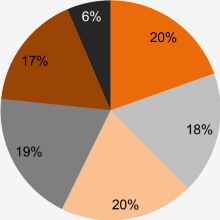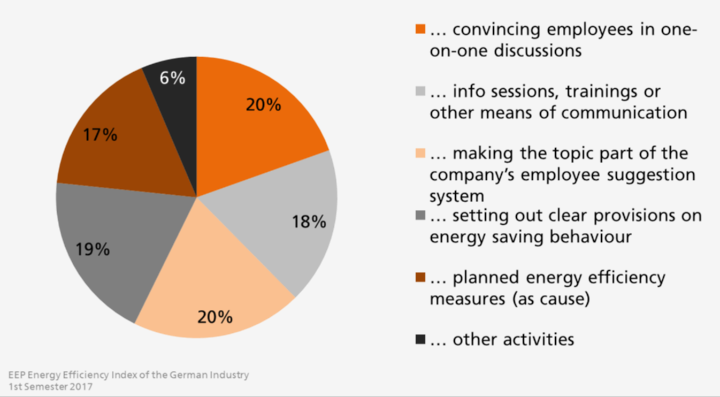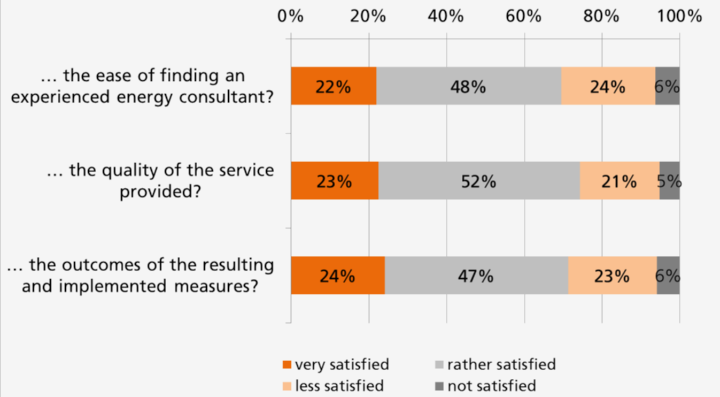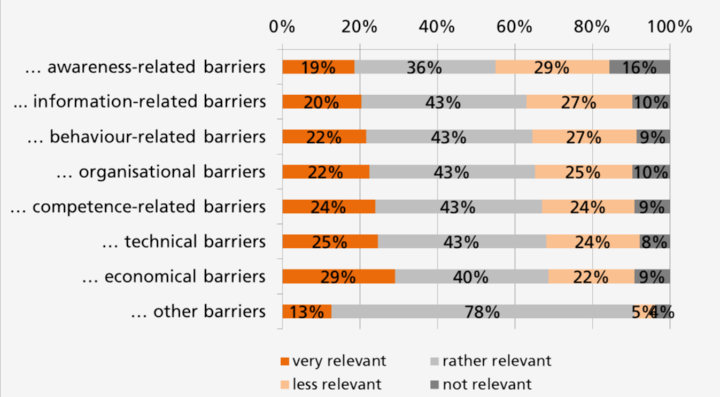Three quarters of German industrial companies are raising their employees’ awareness for energy efficiency. This was the result of the summer survey by the Energy Efficiency Index of the German Industry EEI. The Institute for Energy Efficiency in Production EEP at the University of Stuttgart has been surveying German industry on their current and planned activities of on energy efficiency semi-anually since 2013. EEP collaborates with, among others, the German Energy Agency (dena), Federation of German Industries (BDI), Fraunhofer IPA and TÜV Rheinland. For the first time over 1000 companies took part in the survey.
75% of the German manufacturing companies surveyed by the Stuttgart University Institute for Energy Efficiency in Production EEP take energy efficiency seriously and use a broad variety of channels to raise awareness among their staff.
On the whole, the different measures are used relatively evenly. This is also due to the fact that 62 % of the participants carry out all five measures available: making personal persuasive efforts with individual employees, offering information events or training courses, incorporating energy efficiency in the company’s employee suggestion scheme, issuing clear provisions on energy saving behaviour or using planned energy efficiency measures as an occasion for raising awareness. Only 27 participants stated that they only used one measure. The ambitions of the companies to increase energy efficiency are independent of the way in which the raising awareness among the staff takes place.
For companies that do not raise their employees’ awareness for the topic of energy efficiency, half of these state that they did not know how to go about this. Therefore a high potential can still be exploited in this respect if the relevant information is made easily accessible.
Improvement potential in the field of energy advice
Most companies are only “somewhat” satisfied with the work carried out by professional energy advisors. Scarcely 30 % are less or not at all satisfied. Only a quarter are very satisfied with the quality of the consultancy. Over 70 % of the questioned companies were in turn in satisfied with derived and implemented measures. In the case of the smallest companies the spread is the largest: 26% are very and at the same time 12% are not satisfied at all with the measures (largest share in comparison). Therefore there is room for improvement here.
Wide range of inhibiting factors
29% of all questioned companies classified economic barriers in the implementation of efficiency measures as being very relevant. In contrast only 19 % considered awareness-related barriers to be very relevant. Since all stated barriers were classified as rather or even very relevant by over half of those questioned, the current efforts to reduce the hurdles in the implementation of energy efficiency measures seem to have not yet borne fruit. It is conspicuous that other barriers not yet analysed exist that were classified by 91% of those questioned as being rather or very relevant. “We don’t appear to have cut through the Gordian knot here“, according to EEP’s Executive Director, Professor Alexander Sauer. “More work needs to be done, however, on the classic barriers through the creation of suitable framework conditions and intensive communication tailored to the addressees.“
Overall mood regarding energy efficiency is recovering slightly
On the whole, the energy efficiency index of the german industry EEI has recovered slightly. The driving force for the recovery is increasing investments in energy efficiency measures as well as an improvement in the field of energy productivity. However, no further increase in the general significance of energy efficiency is anticipated for the manufacturing industry in the future. For the first time since the inauguration of the index in 2013, the assessment of the current status of energy efficiency corresponds with the expectations for the coming 12 months. “We have reached a plateau here and are not anticipating any change in the overall mood regarding energy efficiency in German industry. If we want to achieve advancements, we therefore need new impulses from politics“, according to EEP Executive Director Mr Sauer.
All images can be downloaded at: www.eep.uni-stuttgart.de
Note to Editors: EEP is currently expanding the aforementioned work to further countries in the format of the “Energy Efficiency Barometer of Industry (EEBI)”. The initial data collection across English and Spanish international and nine country specific versions closes on 30 June 2017. www.eep.uni-stuttgart.de/eeei
Press contact:
Dr. Birgit Spaeth, Press Office, EEP – University of Stuttgart, Nobelstr. 12, 70569 Stuttgart, Tel: +49 (711) 970-1810, birgit.spaeth@eep.uni-stuttgart.de
Expert Contact:
Dipl.-Wi.-Ing. Diana Wang, Project leader energy efficiency index EEP – University of Stuttgart, Nobelstr. 12, 70569 Stuttgart
Tel: +49 (711) 970-3839, diana.wang@eep.uni-stuttgart.de





